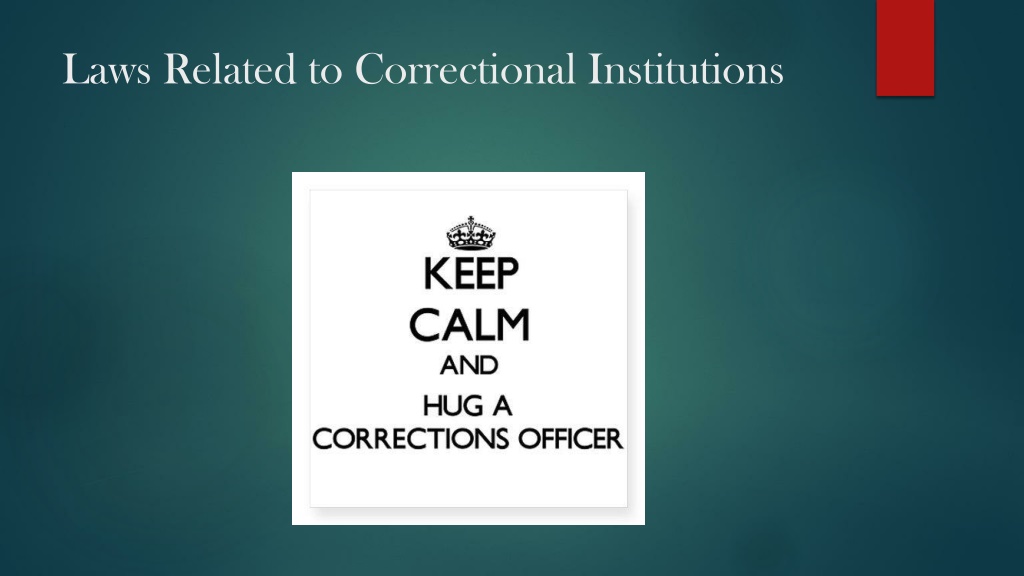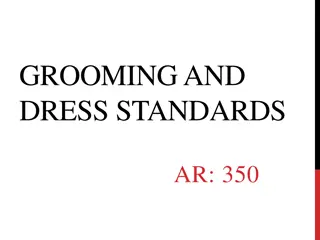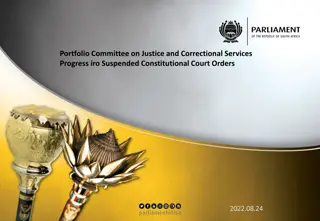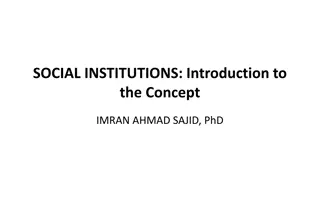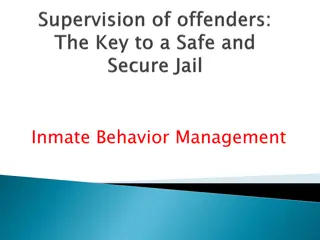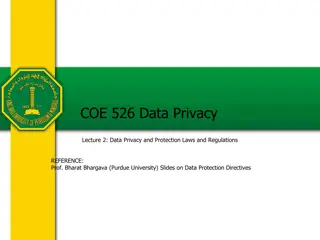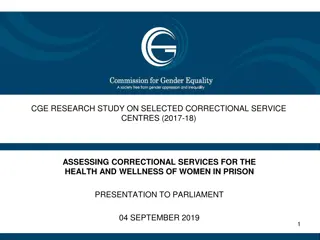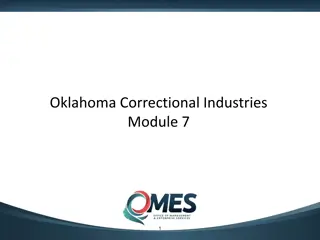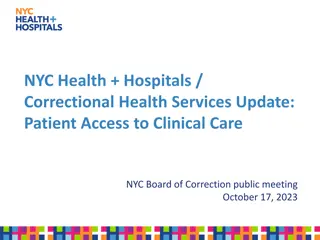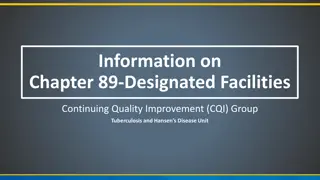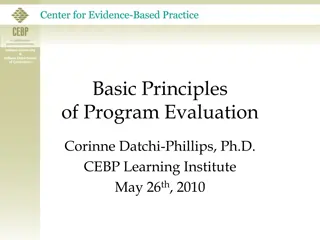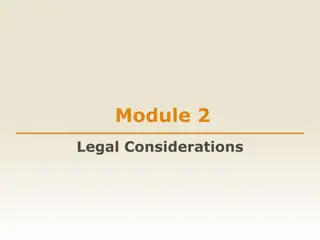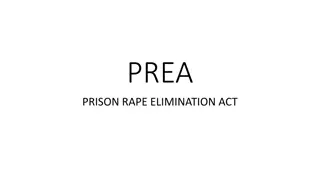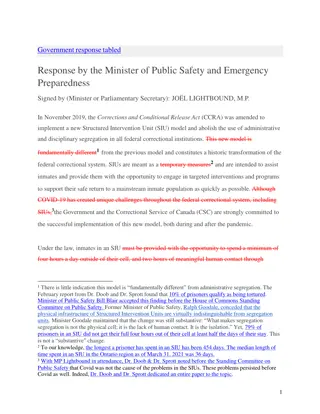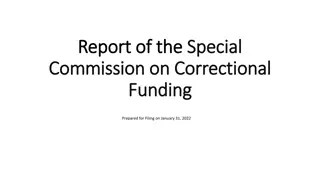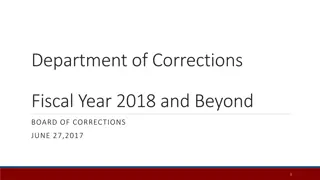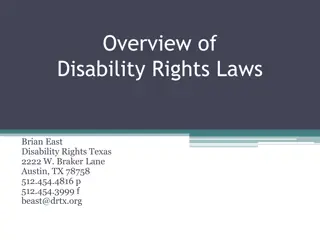Overview of Laws and Concepts in Correctional Institutions
Understanding key legal concepts in correctional institutions, including probable cause, crimes, parties to crimes, types of intent, and classifications of evidence and crime. Explore the definitions and implications of these concepts in the context of the criminal justice system.
Download Presentation

Please find below an Image/Link to download the presentation.
The content on the website is provided AS IS for your information and personal use only. It may not be sold, licensed, or shared on other websites without obtaining consent from the author. Download presentation by click this link. If you encounter any issues during the download, it is possible that the publisher has removed the file from their server.
E N D
Presentation Transcript
Probable Cause: What is PROBABLE CAUSE? Facts and evidences that lead many to believe that the accused actually committed the crime. A probable cause is not a fail proof evidence as it only provides enough grounds to deem the convicted guilty of the crime, and thus to arrest and put the accused to trial. Law Dictionary: What is PROBABLE CAUSE? definition of PROBABLE CAUSE (Black's Law Dictionary)
CRIME: As per NRS193.120 1. forbidden by law and punishable upon conviction by death, imprisonment, fine or other penal discipline. A crime is an act or omission
Parties to a Crime: As Per NRS 195.010 NRS 195.010 are classified as: Classification of parties to crimes. Parties to crimes 1. Principals; and 2. Accessories
Types of Intent??? The mental element in the commission of criminal acts--intent--is discussed and illustrated with examples portrayed from investigating officers' perspectives. Criminal intent is defined as the resolve or determination with which a person acts to commit a crime. Three types of criminal intent exist: (1) general intent, which is presumed from the act of commission (such as speeding);
Types of Intent??? Cont: (2) specific intent, which requires preplanning and presdisposition (such as burglary); and (3) constructive intent, the unintentional results of an act (such as a pedestrian death resulting from the actions of a negligent driver.
Classification of Evidence. Evidence is which tends to prove or disapprove something. There are different classifications of evidence namely; the Direct Evidence, the Indirect or Circumstantial Evidence, Real Evidence, Personal Evidence, Original Evidence and Unoriginal Evidence or Hearsay Evidence.
Classifications of Crime: As per NRS 193.120 1. A crime is an act or omission forbidden by law and punishable upon conviction by death, imprisonment, fine or other penal discipline. 2. Every crime which may be punished by death or by imprisonment in the state prison is a felony. 3. Every crime punishable by a fine of not more than $1,000, or by imprisonment in a county jail for not more than 6 months, is a misdemeanor. 4. Every other crime is a gross misdemeanor.
FELONY: NRS 193.130 1. and except as otherwise provided by specific statute, a person convicted of a felony shall be sentenced to a minimum term and a maximum term of imprisonment which must be within the limits prescribed by the applicable statute, unless the statute in force at the time of commission of the felony prescribed a different penalty. The minimum term of imprisonment that may be imposed must not exceed 40 percent of the maximum term imposed Categories and punishment of felonies. Except when a person is convicted of a category A felony,
FELONY: Cont. 2. Except as otherwise provided by specific statute, for each felony committed on or after July 1, 1995: (a) A category A felony is a felony for which a sentence of death or imprisonment in the state prison for life with or without the possibility of parole may be imposed, as provided by specific statute.
FELONY: Cont. (b) A category B felony is a felony for which the minimum term of imprisonment in the state prison that may be imposed is not less than 1 year and the maximum term of imprisonment that may be imposed is not more than 20 years, as provided by specific statute. (c) A category C felony is a felony for which a court shall sentence a convicted person to imprisonment in the state prison for a minimum term of not less than 1 year and a maximum term of not more than 5 years. In addition to any other penalty, the court may impose a fine of not more than $10,000, unless a greater fine is authorized or required by statute.
FELONY: Cont. (d) A category D felony is a felony for which a court shall sentence a convicted person to imprisonment in the state prison for a minimum term of not less than 1 year and a maximum term of not more than 4 years. In addition to any other penalty, the court may impose a fine of not more than $5,000, unless a greater fine is authorized or required by statute. (e) A category E felony is a felony for which a court shall sentence a convicted person to imprisonment in the state prison for a minimum term of not less than 1 year and a maximum term of not more than 4 years. Except as otherwise provided in paragraph (b) of subsection 1 of NRS 176A.100, upon sentencing a person who is found guilty of a category E felony, the court shall suspend the execution of the sentence and grant probation to the person upon such conditions as the court deems appropriate. Such conditions of probation may include, but are not limited to, requiring the person to serve a term of confinement of not more than 1 year in the county jail. In addition to any other penalty, the court may impose a fine of not more than $5,000, unless a greater penalty is authorized or required by statute.
GROSS MISDEMENOR: NRS 193.140 Punishment of gross misdemeanors. gross misdemeanor shall be punished by imprisonment in the county jail for not more than 364 days, or by a fine of not more than $2,000, or by both fine and imprisonment, unless the statute in force at the time of commission of such gross misdemeanor prescribed a different penalty. Every person convicted of a
MISDEMENOR: NRS 193.150 Punishment of misdemeanors. 1. Every person convicted of a misdemeanor shall be punished by imprisonment in the county jail for not more than 6 months, or by a fine of not more than $1,000, or by both fine and imprisonment, unless the statute in force at the time of commission of such misdemeanor prescribed a different penalty. 2. In lieu of all or a part of the punishment which may be imposed pursuant to subsection 1, the convicted person may be sentenced to perform a fixed period of community service pursuant to the conditions prescribed in NRS 176.087
Civil Law vs. Criminal Law: http://study.com/academy/lesson/criminal-law-vs-civil-law- definitions-and-differences.html
Category III Peace Officer, Powers granted: NRS 289.220 Corrections; certain employees of detention facilities of metropolitan police department. 1. The Director of the Department of Corrections, the Inspector General of the Department, a person employed by the Department as a criminal investigator and any officer or employee of the Department so designated by the Director have the powers of a peace officer when performing duties prescribed by the Director. For the purposes of this subsection, the duties which may be prescribed by the Director include, but are not limited to, pursuit and return of escaped offenders, transportation and escort of offenders and the general exercise of control over offenders within or outside the confines of the institutions and facilities of the Department. 2. A person appointed pursuant to NRS 211.115 to administer detention facilities or a jail, and his or her subordinate jailers, corrections officers and other employees whose duties involve law enforcement have the powers of a peace officer Director, officers and designated employees of Department of
NRS 212.187 prisoner and another person; penalty. Voluntary sexual conduct between A person who voluntarily engages in sexual conduct with a prisoner who is in lawful custody or confinement, other than in the custody of the Division of Parole and Probation of the Department of Public Safety pursuant to NRS 209.4886 or 209.4888 or residential confinement, is guilty of a category D felony and shall be punished as provided in NRS 193.130
OTHER UNAUTHORIZED OR PROHIBITED CONDUCT BY OR WITH PRISONERS: NRS 212.140 prisoner. authorized by law or by any officer authorized thereby, shall have any verbal communication with any prisoner in any jail, prison or other penal institution, or shall bring into or convey out of the same any writing, clothing, food, tobacco or any article whatsoever, shall be guilty of a misdemeanor. Unauthorized communication with Every person who, not being
NRS 212.160 intoxicant or controlled substance to state prisoner; possession of controlled substance by state prisoner. 1. A person, who is not authorized by law, who knowingly furnishes, attempts to furnish, or aids or assists in furnishing or attempting to furnish to a prisoner confined in an institution of the Department of Corrections, or any other place where prisoners are authorized to be or are assigned by the Director of the Department, any deadly weapon, explosive, a facsimile of a firearm or an explosive, any controlled substance or intoxicating liquor, shall be punished: (a) Where a deadly weapon, controlled substance, explosive or a facsimile of a firearm or explosive is involved, for a category B felony by imprisonment in the state prison for a minimum term of not less than 1 year and a maximum term of not more than 6 years, and may be further punished by a fine of not more than $5,000. (b) Where an intoxicant is involved, for a gross misdemeanor. Furnishing weapon, facsimile,
NRS 212.160 Cont 3. A prisoner confined in an institution of the Department of Corrections, or any other place where prisoners are authorized to be or are assigned by the Director of the Department, who possesses a controlled substance without lawful authorization is guilty of a category D felony and shall be punished as provided in NRS 193.130.
NRS 212.170 Furnishing intoxicant to person lawfully confined in jail or detention facility. 1. Any person who sells, barters, exchanges or in any manner disposes of any spirituous or malt liquor or beverage to any person confined in any county or city jail or detention facility is guilty of a gross misdemeanor. 2. This section does not apply to any physician prescribing or furnishing liquor to any such person, when the liquor is prescribed or furnished for medicinal purposes only.
Taylor V. Wolf Read Hand Out
NRS 211.130 sentenced to labor Prisoners deemed 1. Except as otherwise provided in subsection 2, all prisoners sentenced by the judge of any district court, or by the justice of the peace of any Justice Court, and sentenced to a term of imprisonment in any county, city or town jail or detention facility shall be deemed to have been also sentenced to labor during such term, unless the judge or justice of the peace sentencing the prisoner, for good cause, orders otherwise.
NRS 211.140 enter order affecting conditions of confinement of prisoner; labor on public works; medical care of prisoners. 4. The sheriff, chief of police or town marshal shall arrange for the administration of medical care required by prisoners while in his or her custody. The county, city or town shall pay the cost of appropriate medical: (a) Treatment provided to a prisoner while in custody for injuries incurred by a prisoner while the prisoner is in custody and for injuries incurred during the prisoner s arrest for commission of a public offense if the prisoner is not convicted of that offense; (b) Treatment provided to a prisoner while in custody for any infectious, contagious or communicable disease which the prisoner contracts while the prisoner is in custody; and (c) Examinations required by law or by court order conducted while the prisoner is in custody unless the order otherwise provides. Control of prisoners; when court may
NRS 211.140 enter order affecting conditions of confinement of prisoner; labor on public works; medical care of prisoners. Control of prisoners; when court may A prisoner shall pay the cost of medical treatment for: (a) Injuries incurred by the prisoner during his or her commission of a public offense or for injuries incurred during his or her arrest for commission of a public offense if the prisoner is convicted of that offense; (b) Injuries or illnesses which existed before the prisoner was taken into custody; (c) Self-inflicted injuries; and (d) Except treatment provided pursuant to subsection 4, any other injury or illness incurred by the prisoner. 5.
NRS 211.150 disobedience or refusal to work; reports. Punishment for 1. perform his or her tasks, the officers having charge of the prisoner may take action to discipline and punish the prisoner. The action may include confinement to an individual cell separate from other prisoners for the protection of the staff of the jail and other prisoners. An officer who confines a prisoner to an individual cell for any reason shall report his or her action as soon as possible to the person in charge of the jail. If a prisoner is disobedient or disorderly, or does not faithfully A report of the number of prisoners who are performing work and the amount and type of work performed must be submitted to the person in charge of the jail on the last day of each month. 2.
NRS 212.020 prisoners. Inhumanity to 1. A jailer or person who is guilty of willful inhumanity or oppression to any prisoner under the care or custody of the jailer or person shall be punished: (a) Where the prisoner suffers substantial bodily harm from the inhumanity or oppression, for a category D felony as provided in NRS 193.130.
NRS 212.020 prisoners. Cont . Inhumanity to (b) Where no substantial bodily harm results, for a gross misdemeanor. 2. Whether or not the prisoner suffers substantial bodily harm, any public officer guilty of willful inhumanity is guilty of a malfeasance in office
NRS 200.481(2) (f) Battery: Definitions; penalties. (f) If the battery is committed by a probationer, a prisoner who is in lawful custody or confinement or a parolee, without the use of a deadly weapon, whether or not substantial bodily harm results and whether or not the battery is committed by strangulation, for a category B felony by imprisonment in the state prison for a minimum term of not less than 1 year and a maximum term of not more than 6 years.
NRS 212.093 of items adapted, designed or commonly used to escape prohibited; penalty; exception. Except as otherwise provided in subsection 4, a prisoner who is in lawful custody or confinement, other than residential confinement, shall not knowingly manufacture, possess or have in his or her custody or control any key, picklock, bolt cutters, wire cutters, saw, digging tool, rope, ladder, hook or any other tool or item adapted, designed or commonly used for the purpose of escaping or attempting to escape from lawful custody or confinement, whether or not such an escape or attempted escape actually occurs. Manufacture or possession by prisoner 1.
NRS 212.093 of items adapted, designed or commonly used to escape prohibited; penalty; exception. Cont Manufacture or possession by prisoner A prisoner who violates any provision of subsection 1 and who is in lawful custody or confinement for a charge, conviction or sentence for: (a) A felony, shall be punished for a category B felony by imprisonment in the state prison for a minimum term of not less than 1 year and a maximum term of not more than 6 years, and may be further punished by a fine of not more than $5,000. (b) A gross misdemeanor or misdemeanor, shall be punished for a gross misdemeanor. 3. A sentence imposed upon a prisoner pursuant to this section: (a) Is not subject to suspension or the granting of probation; and (b) Must run consecutively after the prisoner has served any sentences imposed upon the prisoner for the offense or offenses for which the prisoner was in lawful custody or confinement when the prisoner violated the provisions of subsection 1 2.
NRS 212.093 of items adapted, designed or commonly used to escape prohibited; penalty; exception. Cont Manufacture or possession by prisoner 4. The provisions of this section do not apply to a prisoner who commits an act described in subsection 1 if the act is authorized by the warden, sheriff, administrator or other person responsible for administering the prison, or his or her designee, and the prisoner performs the act in accordance with the directions or instructions given to the prisoner by that person.
NRS 212.100 escape. A person who, with the intent to effect or facilitate the escape of a prisoner, whether the escape is effected or attempted or not, conveys or sends to a prisoner any information or aid, or conveys or sends into a prison any disguise, instrument, weapon or other thing, or aids or assists a prisoner in escaping or attempting to escape from the lawful custody of a sheriff or other officer or person, shall be punished if the prisoner is held upon a charge, arrest, commitment, conviction or a sentence: Aiding prisoner to
NRS 212.100 escape. Cont Aiding prisoner to 1. For a felony, for a category B felony by imprisonment in the state prison for a minimum term of not less than 1 year and a maximum term of not more than 10 years, and may be further punished by a fine of not more than $10,000. 2. For a gross misdemeanor or misdemeanor: (a) Where a dangerous weapon is used to effect or facilitate the escape or attempted escape, for a category B felony by imprisonment in the state prison for a minimum term of not less than 1 year and a maximum term of not more than 6 years, and may be further punished by a fine of not more than $5,000. (b) Where no dangerous weapon is used, for a gross misdemeanor
NRS 212.165 furnishing portable telecommunications device to prisoner and on possession of such devices in jail or institution or facility of Department of Corrections; penalties; petition for modification of sentence. Prohibition on
NRS 212.165 Cont 1. A person shall not, without lawful authorization, knowingly furnish, attempt to furnish, or aid or assist in furnishing or attempting to furnish to a prisoner confined in an institution or a facility of the Department of Corrections, or any other place where prisoners are authorized to be or are assigned by the Director of the Department, a portable telecommunications device. A person who violates this subsection is guilty of a category E felony and shall be punished as provided in NRS 193.130.
NRS 212.185 of dangerous weapon or facsimile by incarcerated person prohibited. 1. A person who is incarcerated in the state prison or any county or city jail or detention facility or other correctional facility in this State, or is transferred for medical or psychiatric treatment at another institution, or is in transit to or from such facility, or is in the legal custody of any correctional officer or employee, and who possesses or has in his or her custody or control any: (a) Instrument or weapon of the kind commonly known as a blackjack, slungshot, billy, sand-club, sandbag or metal knuckles; (b) Explosive substance, including fixed ammunition, or any incendiary or explosive device; (c) Dirk, dagger, switchblade knife or sharp instrument; (d) Pistol, revolver or other firearm; Possession or control
NRS 212.185 weapon or facsimile by incarcerated person prohibited. Cont.. (e) Facsimile of a firearm or an explosive; (f) Device capable of propelling a projectile with sufficient force to cause bodily harm, including, but not limited to, a pellet gun, slingshot, blowgun, crossbow or bow and arrow; or (g) Other similar weapon, instrument or device, Possession or control of dangerous is guilty of a category B felony and shall be punished by imprisonment in the state prison for a minimum term of not less than 1 year and a maximum term of not more than 6 years
Public Law 108-79(Prison Rape Elimination Act Of 2003) (8) PRISON RAPE. The term prison rape includes the rape of an inmate in the actual or constructive control of prison officials.
